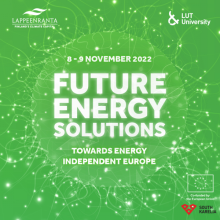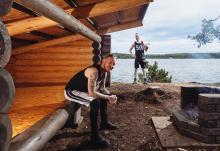It is easy to bicycle in Lappeenranta. There are a total of 275 kilometres of bicycle paths and 95 kilometres of main bicycle routes. The bicycle route network has been consistently developed for many years. In addition to unification, pavements have been renewed, kerbs repaired, intersection road safety improved and routes signposted. Guidance, lighting and bicycle parking spaces have also been increased. The main routes have been selected so that they form a comprehensive and clear network through the city from all directions.
Lappeenranta is a pioneer in recycling, aiming to minimise the final disposal of waste that burdens the environment. In Lappeenranta, separating biowaste from dry waste became mandatory as early as 2002, whereas the law regarding the separation of organic waste did not enter into force, until 2016.
Biowaste has been sorted in Lappeenranta since 2002
Solar power is clean, renewable energy that is great for supplementing other forms of energy as a source of electricity or heat. Despite its northern location, Finland is a good country for solar power. For example, an equal amount of solar power can be produced in a year in both Lappeenranta and Frankfurt; but, in Finland, due to its northern location, the production mostly takes place in the spring, summer and autumn. Only a fraction of solar power is currently utilised.
Pulp has been produced for more than a hundred years at Metsä Group’s Joutseno mill. The mill was completely modernised at the turn of the 21st century. It is the world’s largest single-line softwood pulp mill and a world leader in efficiency and environmental management.
Thanks to a bark gasification plant introduced in 2012, the mill is fossil fuel free and has zero carbon dioxide emissions.
The share of renewable, domestic energy sources in the energy production of Lappeenranta clearly exceeds the national average. The second largest biopower plant in Finland, operated by Kaukaan Voima Oy, generates process steam and electricity for the UPM Kaukas mills. In addition, it supplies Lappeenrannan Energia with district heat and electricity. The plant covers approximately 85% of the annual district heating requirements of the city of Lappeenranta.
TuuliMuukko, which was completed in the summer of 2013, is the first wind farm in South Karelia. It produces electricity using seven wind turbines with a total capacity of 21 MW. The wind power production varies on a daily basis, depending on wind conditions.
For instance, the electricity produced by the seven wind turbines can heat 3,000 detached houses.
The wind farm achieved its production goal in its first full year of operation. For instance, the electricity produced by the seven wind power plants can heat 3,000 detached houses.
The UPM Lappeenranta biorefinery produces wood-based renewable diesel from forest industry residues. The raw material that is used is 100% renewable tall oil, a leftover material from pulp production. UPM is a pioneer in the transformation of the forest industry. The renewable diesel, UPM BioVerno, is produced by a hydrotreating process for advanced biofuels. This innovative production process has been developed in the UPM Biorefinery Research and Development Centre in Lappeenranta.
The Lappeenranta University of Technology’s (LUT) Green Campus is a research and educational environment, where sustainable energy solutions of the future are being built. The Green Campus embodies the university’s solution-oriented and visionary methods and ways of thinking, in a concrete way. LUT’s own inventions and interdisciplinary competencies are utilised in the region.
In the International Sustainable Campus Network competition, LUT’s Green Campus has been awarded best campus in the Excellence in Campus category.
The City of Lappeenranta together with LUT University is organising the Future Energy Solutions conference during 8–9 November 2022 at LUT University in Lappeenranta. The second FES conference can also be attended remotely, but the organisers hope that people in the industry will be able to meet each other and network on the spot for the first time in a while.

During 2021, the City of Lappeenranta celebrated the European Green Leaf Award. The European Green Leaf is a competition organized by the European Commission for cities with remarkable efforts on environmental actions and with a population of 20 000 to 99 999 inhabitants. In Lappeenranta, the improved outdoor, recycling, urban gardening and electric bicycling possibilities of the award year remain available for citizens’ use.

